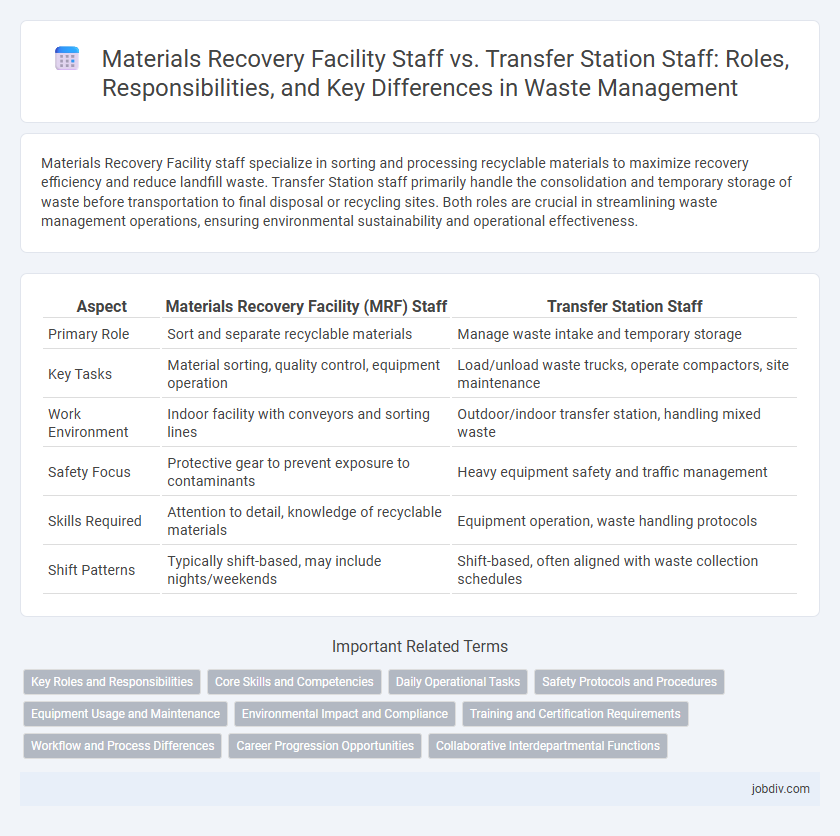Materials Recovery Facility staff specialize in sorting and processing recyclable materials to maximize recovery efficiency and reduce landfill waste. Transfer Station staff primarily handle the consolidation and temporary storage of waste before transportation to final disposal or recycling sites. Both roles are crucial in streamlining waste management operations, ensuring environmental sustainability and operational effectiveness.
Table of Comparison
| Aspect | Materials Recovery Facility (MRF) Staff | Transfer Station Staff |
|---|---|---|
| Primary Role | Sort and separate recyclable materials | Manage waste intake and temporary storage |
| Key Tasks | Material sorting, quality control, equipment operation | Load/unload waste trucks, operate compactors, site maintenance |
| Work Environment | Indoor facility with conveyors and sorting lines | Outdoor/indoor transfer station, handling mixed waste |
| Safety Focus | Protective gear to prevent exposure to contaminants | Heavy equipment safety and traffic management |
| Skills Required | Attention to detail, knowledge of recyclable materials | Equipment operation, waste handling protocols |
| Shift Patterns | Typically shift-based, may include nights/weekends | Shift-based, often aligned with waste collection schedules |
Key Roles and Responsibilities
Materials Recovery Facility (MRF) staff specialize in sorting recyclable materials such as plastics, paper, and metals, ensuring proper separation to enhance recycling efficacy and reduce contamination rates. Transfer Station staff manage the collection, temporary storage, and transfer of waste to final disposal sites or recycling centers, optimizing logistics and maintaining safety protocols. Both roles require knowledge of waste management regulations and contribute to overall environmental sustainability by supporting efficient waste processing systems.
Core Skills and Competencies
Materials Recovery Facility (MRF) staff require expertise in sorting technologies, contamination control, and quality assurance to optimize recyclable material processing and enhance resource recovery efficiency. Transfer Station staff focus on proficient waste logistics, load management, and safety compliance to ensure smooth waste transfer operations and minimize environmental impact. Both roles demand strong teamwork, attention to detail, and adherence to health and environmental regulations for effective waste management.
Daily Operational Tasks
Materials Recovery Facility (MRF) staff focus on sorting, processing, and quality control of recyclables to ensure contamination is minimized and materials meet market standards. Transfer Station staff primarily manage the receipt, inspection, and temporary storage of incoming waste loads, coordinating efficient transfer to disposal or recycling sites. Both roles require strong adherence to safety protocols and operational efficiency but differ in the material handling and processing stages they oversee.
Safety Protocols and Procedures
Materials Recovery Facility (MRF) staff follow strict safety protocols including regular equipment maintenance checks, use of personal protective equipment (PPE) like gloves and helmets, and continuous training on hazardous material handling to minimize injury risks. Transfer Station staff emphasize procedural safety by enforcing proper vehicle movement coordination, implementing traffic control measures, and conducting routine inspections to prevent accidents during waste unloading and transfer. Both roles require adherence to OSHA standards and emergency response plans to ensure workplace safety and environmental compliance.
Equipment Usage and Maintenance
Materials Recovery Facility (MRF) staff operate advanced sorting equipment such as conveyors, optical sorters, and balers, requiring regular calibration and preventive maintenance to ensure optimal performance and minimize downtime. Transfer Station staff primarily manage heavy machinery like compactors, loaders, and trucks, emphasizing equipment upkeep to handle high-volume waste loads efficiently and prevent mechanical failures. Both teams follow strict maintenance schedules and safety protocols to extend equipment life and maintain operational efficiency within their respective facilities.
Environmental Impact and Compliance
Materials Recovery Facility (MRF) staff specialize in sorting recyclable materials to maximize resource recovery and minimize landfill waste, directly reducing environmental pollution and greenhouse gas emissions. Transfer Station staff focus on efficient waste consolidation and transportation, ensuring compliance with environmental regulations to prevent contamination and illegal dumping. Both teams play crucial roles in maintaining regulatory standards and promoting sustainable waste management practices.
Training and Certification Requirements
Materials Recovery Facility staff must complete specialized training in sorting technologies, contamination control, and safety protocols, often requiring certifications such as OSHA hazardous waste operations or SWANA facility management credentials. Transfer Station staff typically focus on equipment operation, waste compaction, and logistics, with mandatory certifications including forklift operation and DOT hazardous materials handling. Both roles demand ongoing education to comply with environmental regulations and ensure worker safety in waste management operations.
Workflow and Process Differences
Materials Recovery Facility (MRF) staff specialize in sorting and processing recyclable materials through automated systems and manual inspection to ensure high-quality recovery streams. Transfer station staff focus on the efficient consolidation and temporary storage of mixed waste before transportation, emphasizing logistics and load management. Workflow in MRFs involves detailed material segregation, whereas transfer stations prioritize bulk handling and rapid turnover to support downstream waste processing.
Career Progression Opportunities
Materials Recovery Facility (MRF) staff benefit from diverse skill development in sorting technology and contamination control, offering clear pathways to supervisory or quality assurance roles within recycling operations. Transfer Station staff gain hands-on experience managing waste logistics and equipment, with career advancement often leading to operations management or environmental compliance positions. Both roles provide foundational expertise, but MRF positions typically present greater specialization and upward mobility in the recycling sector.
Collaborative Interdepartmental Functions
Materials Recovery Facility (MRF) staff specialize in sorting and processing recyclable materials, ensuring contamination is minimized to optimize recycling output. Transfer Station staff coordinate the efficient collection, consolidation, and dispatch of waste to appropriate disposal or processing sites, managing logistics and equipment operations. Collaborative functions between MRF and Transfer Station teams include data sharing on waste composition, synchronizing schedules to maintain throughput, and jointly implementing waste diversion strategies to enhance overall facility efficiency.
Materials Recovery Facility Staff vs Transfer Station Staff Infographic

 jobdiv.com
jobdiv.com